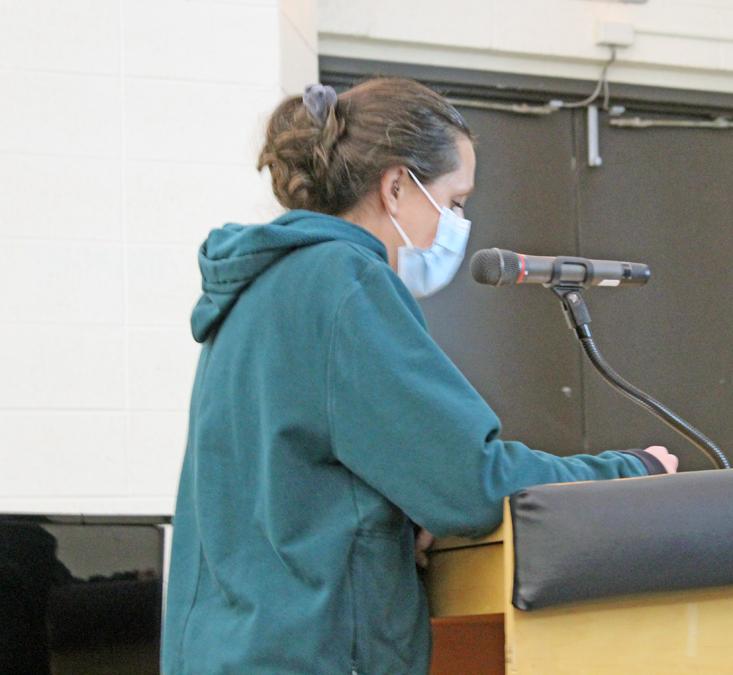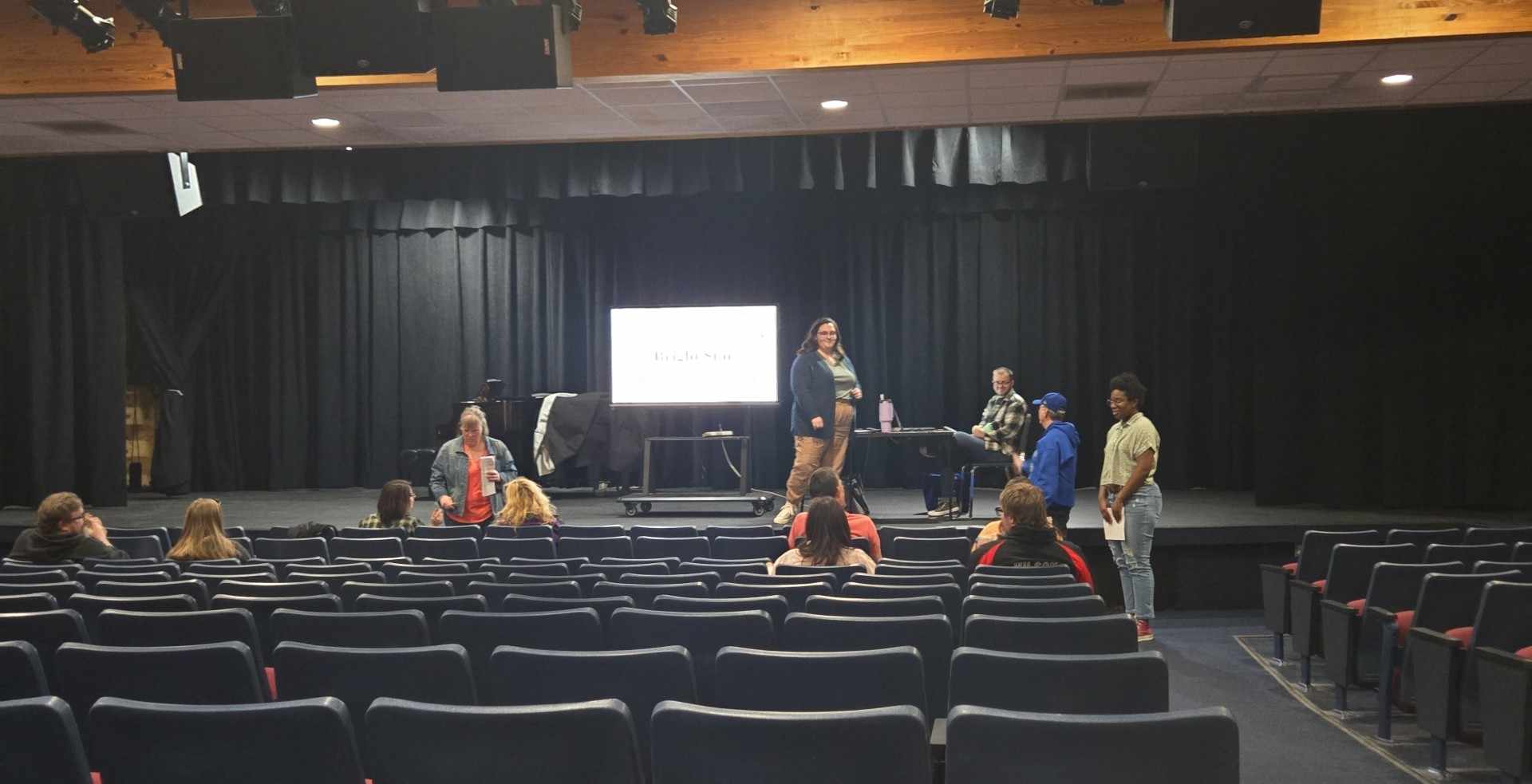Cadott School District continues Research to Practice Inclusive Communities grant


The Research to Practice Inclusive Communities (RPIC) Grant is here to stay, after the Cadott School Board held a vote on the matter during a regular meeting Nov. 9. The grant is meant to help students with disabilities and those in poverty.
Superintendent Jenny Starck gave a brief overview of the equity audit, which is part of the grant.
“It’s a tool that is shared as part of the training, used to collect and analyze data, and to set our priorities, based on our own individual areas of needs,” said Starck.
Laura Eiler talked about how her son, who has special needs, has been included in the classroom more during the past two years, and how it had a positive effect on him. She shared her family’s story at a Cadott School Board meeting, Nov. 9, to explain why she supports the Research to Practice Inclusive Communities (RPIC) grant. The continuation of the grant was approved later in the evening.
Starck says the audit has 112 questions, with 285 data points collected. Out of those questions, Starck says 19 of them are connected to sexual orientation or gender identity.
Starck says there is not a Lesbian, Gay, Bisexual, Transgender, Queer (LGBTQ+) curriculum. She says there is a question, dealing with whether or not staff members have a good understanding of state and federal laws, around gender identity and sexual orientation. Starck says they answered that they were not sure they did, so there was a connected question around professional development.
“So, that is a piece grant funds are not spent on,” said Starck.
Starck also noted it would be a little bit counter- intuitive for the district to reject the technical and financial assistance, since they will still be in the “needs assistance” category.
“We would have to have a corrective action plan,” said Starck. “Right now, this (grant) covers that for us.”
Starck says people have also had questions about books in the library. She says there are some books on topics such as LGBTQ and race, which have been in the library prior to the grant. Starck says that is common for public schools and libraries.
“We do have processes for either parents or community members who have concerns...either content in lessons that are taught or books in the library,” said Starck, so the issues can be raised and the concerns reviewed.
Rod Tegels, board president, says he hopes the discussion helps with some of the concerns he has heard from community members surrounding the grant, since the controversial topics are not being added to the curriculum. He says the district is trying to help the special education kids get the tools they need to be suc- cessful.
Speaking for himself and not the board, Tegels said the last thing he wants is for a child to have nowhere to turn and that school should be a safe place.
“If somebody is struggling with sexual identity, we do own part of that,” said Tegels. “And part of that is getting them the counseling and help that they need to be comfortable in their own skin, regardless of what identity they choose. I know that’s not the popular answer that everyone wants to hear, but that is my belief.”
During public comment, Alisha Woodford, community member, spoke in favor of the grant. Woodford says she extensively reviewed the details of the grant, including reading all information available on the grant application, DPI website, RPIC website and Cadott School website, and has spoken with members of the Grant Committee, and Cadott School administrators and staff.
Woodford also presented a list of 102 names of Cadott School District members who are in support of the grant. She says she gathered those names in less than 24 hours.
“If you need a more formal petition or more people, I’m sure I could provide you with several hundred supporters,” said Woodford.
Woodford says many of the community concerns she has heard, comes down to misinformation and says the grant is to teach educators how to support all students in the classroom, not a student curriculum.
“I find it disheartening that our district would even consider returning these grant funds,” said Woodford.
Laura Eiler, Cadott parent, says she can attest to the importance of inclusion, as she is the parent of a special education student. She says, two years ago, she was worried about her son’s future, as he was not having much success in school.
Eiler says much has changed since then and she cannot say enough good things about the teachers, paraprofessionals and staff who work with her son.
“They’ve attended training, purchased items and found a way to include him in the classroom,” said Eiler.
She says, through the inclusion, her son has learned how to read and communicate, and the district staff is constantly working to help him participate with the class.
“He loves his peers and his peers accept him,” said Eiler.
Eiler pointed out the training and equipment her son, and other special education students, need, costs money, which the grant can help with.
Kristin Drake, fifth-grade teacher, shared how the equity training she attended has already influenced her classroom strategies this year. She said accommodations for students with special needs is often an after-thought when planning lessons and teachers have gotten used to relying on paraprofessionals to assist students who need extra help.
Drake spoke of one student in her class who does not like being pulled out of the classroom for extra help and refuses to use accommodations, if other students aren’t doing the same. She says the discussions they had in equity training started to come together.
“I was determined to figure out how I could help this student be successful in my classroom, without needing to be segregated from their peers,” said Drake.
She says she has started building lesson plans around the student, instead of building in accommodations later, which ensures all her students have a clearer path to success.
“It already has made a noticeable difference,” said Drake.
Drake highlighted the focus areas of the RPIC grant, that students belong in their learning community, and educators are responsible for providing accessible curriculum and environments for every student. A number of others also spoke in favor of keeping the grant.
Kevin Roshell, community member and parent, says he thinks the grant could be helpful for the district and his family, if it is used correctly. He expressed concerns that controversial ideas could be pushed on families, even if that is not the objective of the grant or most of the staff members.
“Nobody wants to see kids fail,” said Roshell, challenging the board, administration and the community, to listen to both sides and find a common ground to make sure the kids succeed.
Mark Schley, board member, commented prior to the vote, that his opinion is the reason the grant has caused such division, is because of poor communication that came out of the administration.
Members approved moving forward with the grant, with six in favor (Tegels, Cedric Boettcher, Becca Blanchette, Donna Albarado, Al Sonnentag, Brad Sonnentag) and one opposed (Schley).
Laura Eiler talked about how her son, who has special needs, has been included in the classroom more during the past two years, and how it had a positive effect on him. She shared her family’s story at a Cadott School Board meeting, Nov. 9, to explain why she supports the Research to Practice Inclusive Communities (RPIC) grant. The continuation of the grant was approved later in the evening. Photo by Julia Wolf


